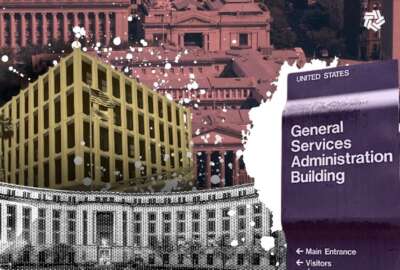Permitting council invests $15M in ‘surge capacity’ for agencies to manage infrastructure boom
Infrastructure projects supported by the Federal Permitting Council have seen a nearly 18-month reduction in the permitting process.
The Biden administration is giving agencies more staffing and capacity to handle the increase in permitting work that comes with a windfall of federally funded infrastructure projects.
To help federal agencies deal with a surge in environmental reviews and other permitting work under the Bipartisan Infrastructure Law and the Inflation Reduction Act, the Federal Permitting Council is investing $15 million in a new contracting tool.
Permitting Council Executive Director Eric Beightel said Tuesday that the funds will go toward procuring temporary contract resources that can enable more timely and efficient reviews.
“We are developing a contract solution to enable agencies to quickly leverage surge support to enable reviews and other permitting work to be completed effectively and on schedule,” Beightel said at the council’s inaugural Infrastructure Developers Summit, held at the Agriculture Department’s Washington, D.C. headquarters.
“This will be a game-changer, as we work with agencies to make sure they have the right type of support at the right time, to avoid unnecessary delays in delivering our critical infrastructure,” he added.
The council, by tapping into resources from the Inflation Reduction Act, has already invested $40 million in federal IT solutions to modernize agencies’ outdated permitting systems.
“This funding is allowing agencies to leverage artificial intelligence to increase the efficiency of administrative tasks, freeing up subject matter experts to do the analytical thinking,” Beightel said.
Beightel said the council is also funding projects to help agencies roll out web-based permit applications. Funding, he added, is also going to better mapping and data-sharing strategies to “help staff and applicants alike access information necessary to design and build these projects.”
“We can’t afford to rely on outdated systems and inefficient procedures, or siloed thinking with parochial interests for us to achieve our infrastructure goals,” he said.
Improving hiring, collaboration
The council is also working with the Office of Personnel Management to support cross-agency hiring initiatives meant to cut down on administrative burden and fill vacant positions sooner.
“Considering the number of new permitting hires needed to address the surge of projects, we also recognize that there’s work to be done to make the hiring process more efficient,” Beightel said.
The council, so far, has helped 40 projects navigate federal environment review and permitting requirements, and advance those projects to construction and operation.
Beightel said projects supported by the council, on average, make it through the federal permitting process nearly 18 months faster than other projects.
“It is our mission to move projects forward on a predictable timeline with transparency into the steps and sequencing necessary to complete the process, and by holding agencies and sponsors accountable to meeting that timeline,” he said.
Lael Brainerd, director of the National Economic Council, said the council’s $15 million investment will give federal agencies the “surge capacity” needed for better and faster permitting.
“We know we cannot build the best infrastructure in the world, we can’t be the leader in the industries of the future — we can’t have fabs constructed on time to do leading-edge semiconductor production, and we’re not going to be able to build data centers fast enough to retain global preeminence in AI — without having fast and streamlined permitting processes,” Brainerd said.
The White House’s Council on Environmental Quality recommended in July that agencies leverage digital tools to modernize the environmental review process.
“A few weeks ago, the President pulled the Cabinet together, and he had one simple message: We all need to move faster to facilitate all these incredibly important private sector and public sector investments to get projects up and running,” Brainerd said.
Acting Interior Deputy Secretary Laura Daniel-Davis said the permitting council, by tapping into resources from the Bipartisan Infrastructure Law and the Inflation Reduction Act, is “upping our game, in terms of the guts of how this work needs to happen inside an agency.”
“That can be anything from IT, to just the bodies and the people to get the permitting done. I think all of those are incredibly important improvements that we’re proud of, and I think they’re lasting improvements,” Daniel-Davis said.
The Interior Department has permitted over 41 projects on federal lands during the Biden administration. The department has exceeded its goal of providing 25 gigawatts of energy by 2025 through solar, wind, geothermal and other clean-energy projects.
The permitting council maintains an online dashboard keeping track of federally funded infrastructure upgrades.
“The dashboard is a visual representation of a lot of work that happens in the agencies at DOI. There are days I feel like every component of DOI is involved in one project or another, and it then becomes really important, what’s behind these milestones, what’s behind the dashboard?” Daniel-Davis said.
Beightel said the council also ensures agencies and industries alike have a seat at the table on permitting decisions.
“This helps everyone understand how a delay on one permit can have a cascading effect on project delivery. By moving construction dates, labor availability, part shipments and countless other factors beyond permitting, they can influence a project’s ultimate success,” he said.
The Biden administration’s infrastructure agenda also plays a significant role in meeting an ambitious goal of making the U.S. energy industry carbon pollution-free by 2035 and achieving a net-zero emissions economy by no later than 2050.
Deputy Energy Secretary David Turk said that the U.S. put twice as much clean energy on the electrical grid in 2024 than in any other year.
Turk said the U.S. is also significantly higher demand for electricity for the first time in about 15 years. To stay on track with the administration’s goals, Turk said permitting agencies need to keep pace with industry.
“For us to build at the scale and the pace that we need to, it’s got to be the private sector. It’s got to be investors. It’s got to be entrepreneurs. It’s got to be developers who are unleashed. That doesn’t mean you get to do anything you want, everywhere you want, but it also doesn’t mean that you get bogged down for years and years and years when there’s good projects to be had,” Turk said.
“We need to have humility to make sure that we are doing our job at the pace and scale of which we all need to be doing, certainly to build out the clean energy future going forward,” he added.
Copyright © 2024 Federal News Network. All rights reserved. This website is not intended for users located within the European Economic Area.
Jory Heckman is a reporter at Federal News Network covering U.S. Postal Service, IRS, big data and technology issues.
Follow @jheckmanWFED






